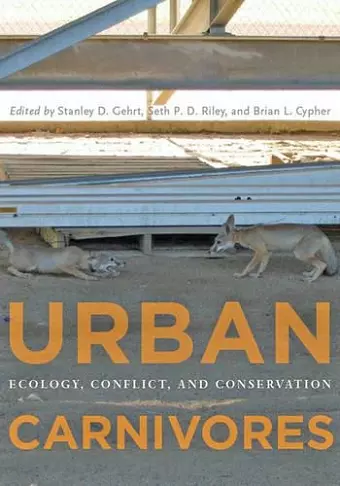Urban Carnivores
Ecology, Conflict, and Conservation
Stanley D Gehrt editor Seth P D Riley editor Brian L Cypher editor
Format:Hardback
Publisher:Johns Hopkins University Press
Published:7th May '10
Currently unavailable, and unfortunately no date known when it will be back

With over half of the world's human population now living in cities, human-carnivore interaction in urban areas is a growing area of concern and research for wildlife managers, conservationists, urban planners, and the public at large. This volume brings together leading international carnivore researchers to explore the unique biological and ecological issues associated with mammalian carnivores in urban landscapes. Carnivores in urban areas are fascinating from an ecological standpoint. They elicit great passions-positive and negative-among humans and present difficult challenges for wildlife conservationists and managers. The first section of the book discusses the field of urban ecology and the many potential roles of carnivores in urban ecosystems, details the general behavior and ecology of this group of mammals, and addresses the human side of potential conflicts between people and carnivores in cities. The second section provides species accounts of the most common urban carnivores, including raccoons, coyotes, foxes, skunks, and mountain lions. A separate chapter examines the very specialized place of domesticated cats and dogs. The last section compares how various carnivore species fare in cities, looks at the utility of existing conservation and conflict management efforts, and suggests directions for further research and future management initiatives. This thorough examination of the conflicts and complications surrounding urban wildlife is the first to focus specifically on carnivores. It includes an extensive bibliography and is an essential reference for wildlife biologists, mammalogists, and urban planners.
Pioneering, seminal work... Essential. Choice 2010 Urban Carnivores is a must-read for beginning wildlife biologists and managers and will challenge those in the middle of their careers to think differently regarding carnivores in urban areas. Although the book focuses on carnivores, it becomes clear that urban areas differ from natural areas and our understanding of basic ecology for well-known species may not apply to those residing in urban and suburban locations. Biologists often write off urban areas as valuable wildlife habitat and instead prefer to deal with natural areas. This book discusses why biologists and managers should consider conserving urban carnivores and introduces the idea of urban carnivores as ambassadors for wildlife, as well as how urban carnivores may assist with regional population stability. Journal of Wildlife Management 2011 An engaging and informative read for any naturalist with a desire to better understand some of our non-human neighbors, and to cultivate an understanding of the issues involved in learning to coexist peacefully with them. -- Christine Adkins Discovery 2010
ISBN: 9780801893896
Dimensions: 254mm x 178mm x 23mm
Weight: 726g
304 pages